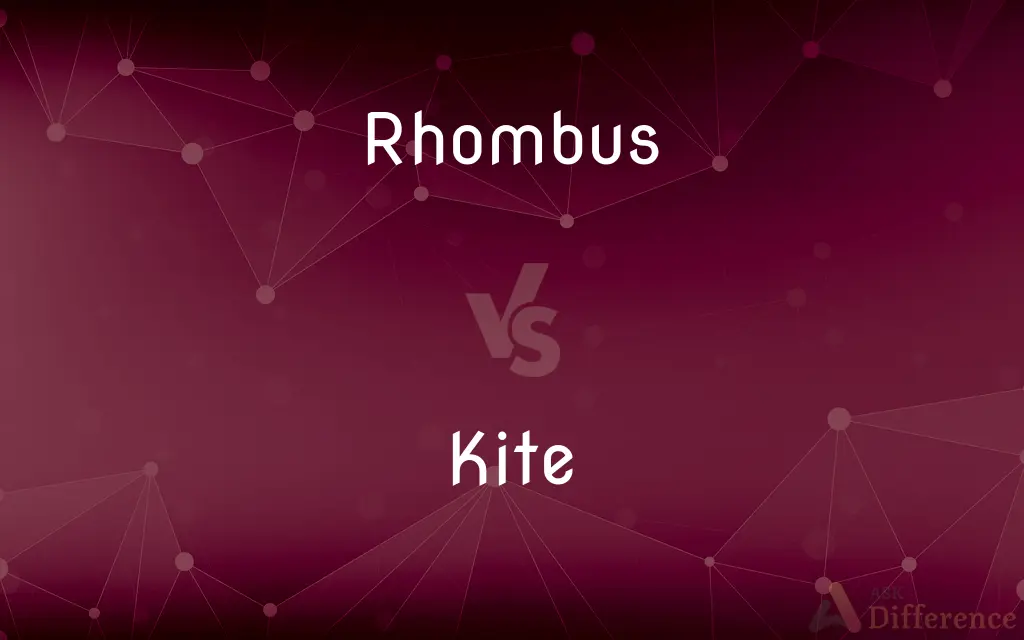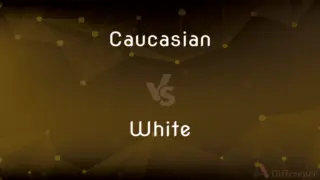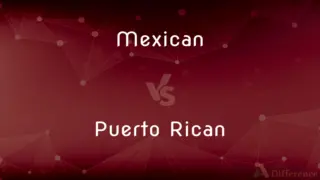Rhombus vs. Kite — What's the Difference?
By Tayyaba Rehman — Published on October 10, 2023
A rhombus is a parallelogram with all four sides of equal length and opposite equal acute and obtuse angles. A kite has two pairs of adjacent sides of equal length, but the opposite sides are generally not equal.

Difference Between Rhombus and Kite
Table of Contents
ADVERTISEMENT
Key Differences
A rhombus and a kite are both four-sided polygons, known as quadrilaterals, but they have different properties and characteristics. A rhombus is a type of parallelogram where all four sides are of equal length, and opposite angles are equal. A kite, conversely, is defined by having two pairs of adjacent sides that are equal in length, with no requirements for the opposite sides or angles to be equal, giving it a more varied range of shapes compared to a rhombus.
The rhombus has certain defining properties that distinguish it; for instance, the diagonals of a rhombus bisect each other at right angles and are not necessarily equal. It also has opposite equal acute and obtuse angles. In contrast, a kite has a different set of properties; its diagonals are perpendicular but don’t usually bisect each other, and it usually has one pair of equal angles.
A rhombus has a more symmetrical, regular shape due to its equal sides and angles, which also means it has an equal and symmetrical distribution of area and perimeter. A kite, however, has a less uniform shape, typically with a longer, narrower upper half, which can result in a varied distribution of area and perimeter, dependent on the length of the adjacent equal sides and the included angle.
In practical application, the properties of a rhombus are often explored in geometry and various mathematical problems due to its symmetrical attributes and clear, concise properties. A kite, with its less regular shape and varied properties, offers a broader range of explorative opportunities in mathematical contexts, enabling a study of different kinds of angle and side relationships within quadrilaterals.
The understanding of the properties of a rhombus and a kite is pivotal in geometry, helping in the analysis of space, shape, size, relative position of figures, and the properties of space. A rhombus, with its congruent sides and angles, offers insights into symmetry and regularity, while a kite, with its varying shapes and angles, offers insights into asymmetry and irregularity within quadrilaterals.
ADVERTISEMENT
Comparison Chart
Definition
Parallelogram with all four sides equal
Has two pairs of adjacent sides equal
Diagonals
Bisect each other at right angles
Are perpendicular but don’t usually bisect each other
Angles
Opposite equal, acute and obtuse angles
Usually has one pair of equal angles
Symmetry
More symmetrical due to equal sides and angles
Less symmetrical with varied shapes
Shape Regularity
Regular and symmetrical shape
Can have irregular and varied shapes
Compare with Definitions
Rhombus
Possesses diagonals that bisect each other at right angles.
The diagonals in a rhombus always intersect perpendicularly.
Kite
Its diagonals are perpendicular but do not usually bisect each other.
The diagonals in a kite intersect at right angles but don’t usually divide each other equally.
Rhombus
Has a symmetrical and regular shape due to equal sides and angles.
The symmetry in a rhombus is evident in its equal side lengths and angle measures.
Kite
It offers insights into asymmetry and irregularity within quadrilaterals.
Studying the properties of a kite helps in understanding varied angle and side relationships in quadrilaterals.
Rhombus
It is a type of polygon used in geometry to study space, size, and shapes.
Studying a rhombus provides insights into the properties of symmetrical polygons.
Kite
A polygon with distinct properties studied in geometry.
A kite, with its unique set of properties, is often explored in geometric studies to understand spatial relationships and shapes.
Rhombus
A quadrilateral with all four sides of equal length.
A square is a special type of rhombus with all right angles.
Kite
A light framework covered with cloth, plastic, or paper, designed to be flown in the wind at the end of a long string or multiple lines, especially for recreation.
Rhombus
A parallelogram with opposite equal acute and obtuse angles.
In a rhombus, each pair of opposite angles are equal.
Kite
A parafoil flown in a similar manner for recreation.
Rhombus
An equilateral parallelogram, especially one having oblique angles. Also called rhomb.
Kite
A power kite.
Rhombus
(geometry) A parallelogram having all sides of equal length.
Kite
A quadrilateral with two distinct pairs of congruent, adjacent sides. Also called deltoid.
Rhombus
The rhombus diamond, as one of the suits seen in a deck of playing cards (♦ or ♦).
Kite
Any of the light sails of a ship that are used only in a light wind.
Rhombus
In early Greek religion, an instrument whirled on the end of a string similar to a bullroarer.
Kite
Any of various graceful predatory birds of the family Accipitridae, having long pointed wings and often a forked tail.
Rhombus
Any of several flatfishes, including the brill and turbot, once considered part of the genus Rhombus, now in Scophthalmus.
Kite
An instance of check kiting.
Rhombus
Snails, now in genus Conus or family Conidae.
Kite
To fly like a kite; soar or glide.
Rhombus
Same as Rhomb, 1.
Kite
To get money or credit with a kite.
Rhombus
A parallelogram with four equal sides; an oblique-angled equilateral parallelogram
Kite
To use (a check) in furtherance of a check kiting scheme.
Kite
A bird of prey of the family Accipitridae.
A pair of kites built a nest on the cliff.
Kite
Any bird of the subfamily Milvinae, with long wings and weak legs, feeding mostly on carrion and spending long periods soaring; specifically, the red kite (Milvus milvus) and the black kite (Milvus migrans).
Kite
A bird of the genus Elanus, having thin pointed wings, that preys on rodents and hunts by hovering; also, any bird of related genera in the subfamily Elaninae.
Kite
Some species in the subfamily Perninae.
Kite
(figuratively) A rapacious person.
Kite
A lightweight toy or other device, traditionally flat and shaped like a triangle with a segment of a circle attached to its base or like a quadrilateral (see sense 9), carried on the wind and tethered and controlled from the ground by one or more lines.
On windy spring days, we would fly kites.
Kite
A tethered object which deflects its position in a medium by obtaining lift and drag in reaction with its relative motion in the medium.
Kite
(astrology) A planetary configuration wherein one planet of a grand trine is in opposition to an additional fourth planet.
Kite
A blank cheque; a fraudulent cheque, such as one issued even though there are insufficient funds to honour it, or one that has been altered without authorization.
Kite
An favour]] and without compensation.
Kite
A rider who is good at climbs but less good at descents.
Kite
(geometry) A polygon resembling the shape of a traditional toy kite (sense 3): a quadrilateral having two pairs of edges of equal length, the edges of each pair touching each other at one end.
Four-sided figures without parallel sides include trapezoids and kites.
Kite
An aeroplane or aircraft.
Kite
In a square-rigged ship: originally a sail positioned above a topsail; later a lightweight sail set above the topgallants, such as a studding sail or a jib topsail.
Kite
A supplementary sail to a mainsail.
Kite
The brill (Scophthalmus rhombus), a type of flatfish.
Kite
A (usually concealed) letter or oral message, especially one passed illegally into, within, or out of a prison.
Kite
The stomach; the belly.
Kite
(Egyptology) A measure of weight equivalent to 10 deben (about 0.32 ounces or 9.1 grams).
Kite
(transitive) To cause (something) to move upwards rapidly like a toy kite; also to cause (something, such as costs) to increase rapidly.
Rising interest rates have kited the cost of housing.
Kite
To tamper with a document or record by increasing the quantity of something beyond its proper amount so that the difference may be unlawfully retained; in particular, to alter a medical prescription for this purpose by increasing the number of pills or other items.
Kite
To keep ahead of (an enemy) in order to attack repeatedly from a distance, without exposing oneself to danger.
Kite
(ambitransitive) To (cause to) glide in the manner of a bird.
The wind kited us toward shore.
Kite
To manipulate like a toy kite; also, usually preceded by an inflection of go: to fly a toy kite.
Want to go kite with me this weekend?
Kite
To write or present (a cheque) on an account with insufficient funds, either to defraud or expecting that funds will become available by the time the cheque clears.
He was convicted of kiting checks and sentenced to two years in prison.
Kite
To steal.
Kite
(intransitive) To travel by kite, as when kitesurfing.
We spent the afternoon kiting around the bay.
Kite
To move rapidly; to rush.
Kite
To deflect sideways in the water.
Kite
To pass a (usually concealed) letter or oral message, especially illegally into, within, or out of a prison.
Kite
Any raptorial bird of the subfamily Milvinæ, of which many species are known. They have long wings, adapted for soaring, and usually a forked tail.
Kite
Fig.: One who is rapacious.
Detested kite, thou liest.
Kite
A light frame of wood or other material covered with paper or cloth, for flying in the air at the end of a string.
Kite
A lofty sail, carried only when the wind is light.
Kite
A quadrilateral, one of whose diagonals is an axis of symmetry.
Kite
Fictitious commercial paper used for raising money or to sustain credit, as a check which represents no deposit in bank, or a bill of exchange not sanctioned by sale of goods; an accommodation check or bill.
Kite
The brill.
Kite
A form of drag to be towed under water at any depth up to about forty fathoms, which on striking bottom is upset and rises to the surface; - called also sentry.
Kite
The belly.
Kite
To raise money by "kites;" as, kiting transactions. See Kite, 6.
Kite
A bank check that has been fraudulently altered to increase its face value
Kite
A bank check drawn on insufficient funds at another bank in order to take advantage of the float
Kite
Plaything consisting of a light frame covered with tissue paper; flown in wind at end of a string
Kite
Any of several small graceful hawks of the family Accipitridae having long pointed wings and feeding on insects and small animals
Kite
Increase the amount (of a check) fraudulently;
He kited many checks
Kite
Get credit or money by using a bad check;
The businessman kited millions of dollars
Kite
Soar or fly like a kite;
The pilot kited for a long time over the mountains
Kite
Fly a kite;
Kids were kiting in the park
They kited the Red Dragon model
Kite
A quadrilateral with two pairs of adjacent, equal-length sides.
A kite can be recognized by its adjacent equal sides and typically asymmetrical shape.
Kite
Usually has one pair of equal angles and can have varied shapes.
The unequal angles in a kite often result in an asymmetrical shape.
Common Curiosities
Do the diagonals in a Rhombus bisect each other?
Yes, the diagonals in a rhombus bisect each other at right angles.
Do both pairs of opposite sides in a Kite have equal length?
No, in a kite, generally only the adjacent sides are equal, not the opposite sides.
How is a Kite characterized?
A kite is characterized by having two pairs of adjacent sides that are equal in length and usually one pair of equal angles.
Are all sides of a Rhombus equal?
Yes, all four sides of a rhombus are of equal length.
What defines a Rhombus?
A rhombus is defined as a parallelogram with all four sides of equal length and opposite equal acute and obtuse angles.
Are the diagonals in a Kite always equal?
No, the diagonals in a kite are not necessarily equal and generally do not bisect each other.
Is a square a special type of Rhombus?
Yes, a square is a special type of rhombus where all angles are right angles.
Can a Kite have a symmetrical shape?
Typically, a kite has an asymmetrical shape due to the unequal length of opposite sides and unequal opposite angles.
Is the shape of a Rhombus always regular and symmetrical?
Yes, due to its equal sides and angles, a rhombus always has a regular and symmetrical shape.
Share Your Discovery

Previous Comparison
Caucasian vs. White
Next Comparison
Mexican vs. Puerto RicanAuthor Spotlight
Written by
Tayyaba RehmanTayyaba Rehman is a distinguished writer, currently serving as a primary contributor to askdifference.com. As a researcher in semantics and etymology, Tayyaba's passion for the complexity of languages and their distinctions has found a perfect home on the platform. Tayyaba delves into the intricacies of language, distinguishing between commonly confused words and phrases, thereby providing clarity for readers worldwide.
















































